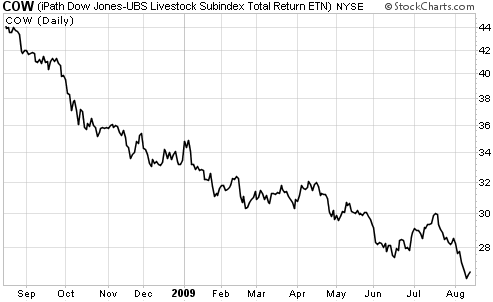 | ||||
 | ||||
How to Play the Collapse in Meat Prices
By Tom Dyson
I just got an e-mail from a friend of mine who's a pig farmer…
"The pork industry is just about ready to implode," he writes.
My friend runs a farm in one of the most important hog farming regions of the country: Sioux County, Iowa. He grows corn and soybeans on his farm. Then, he feeds the grain to several thousand head of hogs. He also raises cattle and runs a hog breeding operation.
My friend always keeps me updated on the hog industry. And right now, he says demand for pork has crashed. The meatpackers can't get rid of their pork inventory, so they've cut the number of pigs they slaughter by 50,000-60,000 thousand hogs per day.
Because the meatpackers aren't slaughtering as many pigs, there's a backup of live hogs on the farms. Lean hog prices have fallen about 50% from their 2008-highs.
"It has gotten so bad that I was recently offered 5,000 head of piglets for free, zero, nothing. Just come on down and pick them up," says my friend. "Today's futures prices are so low, I would still lose $10 per head feeding free pigs."
Beef prices are falling, too... although not as severely. Demand for steak has collapsed in the recession and there's so much oversupply, meatpackers are being forced to turn their high-end steaks into hamburgers in order to sell them. Live cattle prices have fallen 18% from 2008 highs.
The IPath UBS Livestock ETN (COW) tracks livestock prices. It's made up of 69% cattle futures and 31% lean hog futures. It's down 47% since October 2007.
|
Here's the thing, while livestock prices collapse, the stock prices of the giant meat companies, Tyson and Hormel, have soared in the stock market bounce. Tyson is the world's largest processor of beef, pork, and chicken. Its stock is up 150% since last November. Hormel is another processed meat giant, specializing in pork. Its stock is up 55% since December.
Shorting these businesses is one way to play the collapse in meat prices. The oversupply of meat combined with the collapse in demand is causing supermarkets to discount meat products, which pinches their profits.
Shorting corn is a second strategy. With livestock on the ropes, demand for feed corn should fall. But according to my Iowa contact, there's going to be a record breaking Midwest corn crop this year.
"Corn on the board could easy lose a dollar per bushel from this point," he says.
Feeding Frenzy in the Hog Industry
How to Buy High-Profit Corn






















